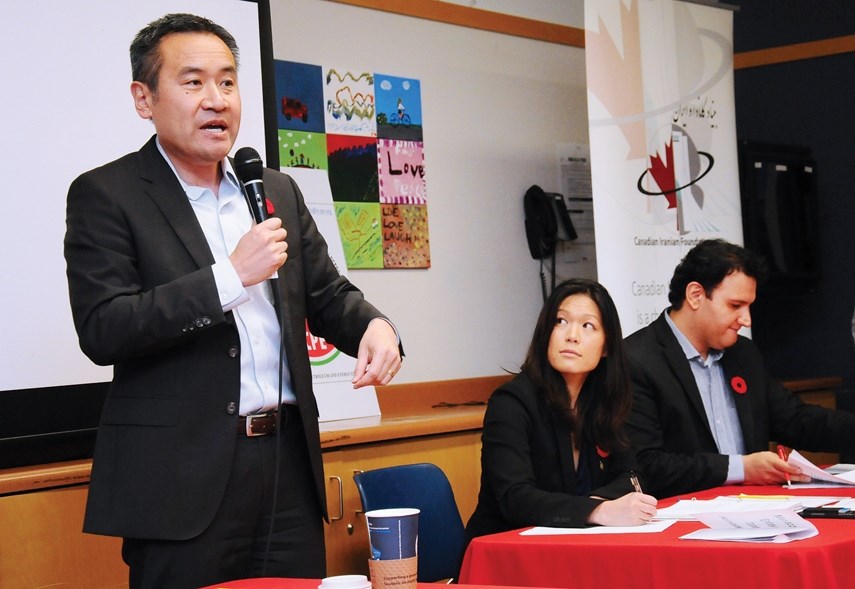Have you done your duty yet? You know what I’m talking about. The future of B.C. democracy lies in your hands and you have exactly one week to determine how future provincial governments will be elected.
Have I got your attention yet?
I’m trying my best. And I’m trying not to use the term “proportional representation” which induces instant yawns and snores. I’ll stick to the “pro rep” abbreviation: sounds peppier. That said, there’s no easy way to talk about this potentially massive change in our democratic process. Massive in that, for better or worse, the representative system we’ve used since the dawn of democracy could change forever after the referendum deadline of Nov. 30.
At first, this change will apply only to provincial politics, but how long will it be before the movement to bring pro rep to the federal and municipal level gets up a head of steam and we end up with electoral reform everywhere all the time?
So far, only 18 per cent of eligible voters have mailed in their ballots indicating a preference for either the old way or the new way. Surprisingly feeble for a historic change in the way we govern ourselves. Some people are blaming the rotating postal strikes, but seriously, if you want to get your referendum ballot to Elections BC, you actually have to fill it out and mail it, whatever our brothers and sisters at Canada Post are up to.
So what are we voting for exactly? Choose one:
The Old Way: first past the post. Everybody votes in an election and the candidate with the most votes wins. Simple. Unfortunately, many believe first past the post is the blunt instrument of democracy. What about all those votes for the candidate who didn’t get elected? With first past the post, they are basically ignored.
The New Way: pro rep. The new government reflects the actual voting breakdown. If party A gets 40 per cent of the votes, they get 40 per cent of the seats in the legislature, and so on. If pro rep prevails in this referendum, parties with five per cent or more of the vote will send elected representatives to Victoria. Even if it’s the Flying Spaghetti Monster party or the North Shore Separatist party.
Now it gets complicated. The NDP government has chosen to structure the ballot so that if you vote old or new, you’re asked to indicate your preference for one of three new systems. I’ll say them once, just in case you need to answer a trivia question: dual member, mixed member and rural-urban member. You can indicate a single preference or rank them one, two, three.
This is not easy. The Elections BC Voter’s Guide is 24 pages long. NDP Advanced Education Minister Melanie Mark, who has a political science degree, was caught on camera trying and failing to explain the details of the various choices. If she can’t explain it, what about the rest of us bums?
You could argue (and that’s exactly what I’m doing) that the government could have selected the best pro-rep option based on research and experience and boiled the choice down to Old Way versus One New Way. As it stands, one of the three choices, dual member, has never been used anywhere. At least the other two have been tested in places like Germany and New Zealand (mixed member), and Ireland (rural-urban).
The other murky point is what happens after the referendum. Various government committees will try to come up with a way to implement pro rep if it wins. Please see history of B.C. to gauge the effectiveness of various government committees.
So. Even if you’re inclined toward more proportional representation in your democracy, there’s a lot to hold your nose about on this experiment:
1) We’re being asked to support this exercise in improving representation by a simple first-past-the-post majority: 50 per cent plus one. Irony, anyone?
2) People who vote against pro rep can also vote on the three pro rep choices. Isn’t that the equivalent of voting yes and no at the same time?
3) Why three competing pro-rep systems?
4) Why are we including a system that has never been tested on Earth (or Mars for that matter)?
5) Why leave it all in the hands of various government committees?
6) Is this a pig in a poke?
I don’t know about you, but I would breathe easier if it were a less complex vote: Old Way versus Best New Way.
As it stands now, we’re faced with doing our duty without knowing what we’re doing.
Here goes ... elections.bc.ca/referendum
What are your thoughts? Send us a letter via email by clicking here or post a comment below.



